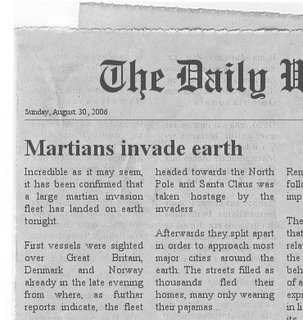 Americans are usually very proud of their freedom of speech and press, and tout it as an exemplary way of life to other nations, especially those in which democracy doesn’t exist or is limited and perhaps corrupt. Generally we think of this freedom in the form of a writer being able to tell the truth, which would be the ideal. And one is also free to express his or her views, but in that case great care should be taken that something isn’t presented as a fact if it is just an opinion.
Americans are usually very proud of their freedom of speech and press, and tout it as an exemplary way of life to other nations, especially those in which democracy doesn’t exist or is limited and perhaps corrupt. Generally we think of this freedom in the form of a writer being able to tell the truth, which would be the ideal. And one is also free to express his or her views, but in that case great care should be taken that something isn’t presented as a fact if it is just an opinion.Nothing unfortunately prevents a crooked or biased journalist or reporter presenting fiction or lies as truth. If given a choice, people usually choose an interpretation of news that pleases them the most, or whets their appetite for scandal and sensation. During the first years of the war in Iraq many Americans turned to Fox News because it painted a rosy picture of the U.S. and the coalition forces’ success. The network presented the war in a more victorious way than CNN, for example. It was as if questioning the reasons for the occupation, or mentioning the casualties, was unpatriotic, and something we didn’t want to hear and read about. Of course, today people no longer blindly believe all the fairy tales coming out of the White House press room. Assassinating Saddam’s sons and capturing the former Iraqi leader himself was supposed to bring hostilities to a quick end. As this didn’t happen, we found a reason: Al-Qaida was sending foreign terrorists to Iraqi soil and all the mayhem was their doing. Not to worry: we had a handle on the situation and in no time the country’s own police force was going to take over and bring peace to the people (and cheap oil to us). While some of this was true (there have been a number of foreign militants in Iraq who have entered the country to drive the infidels and occupiers out), our leaders flatly denied that at the root of the chaos was sectarian violence, hatred between different Muslim groups. The press secretary and Mr. Rumsfeld have been quick to dismiss any talk about civil war, something that seems quite obvious today to most people aware of the situation, including our own military leaders in Iraq.
Recently the Lancet, a very respected medical journal, published its detailed study on the amount of casualties in Iraq. It came up with a number of completely different magnitude than we had seen before, with probably over 600,000 Iraqi victims. Statistical error margin puts the figure at 200,000 at the low end and close to a million at the maximum. Our government and Neo-Conservatives were immediately ridiculing the study, without even bothering to examine the methods used to come up with the staggering number of dead. For many people, hearing the President say that the Lancet article ‘was not true’ was enough, although how would he himself know. Obviously there is more than a little bit of truth behind the journal’s conclusions. A few decades from now, or possibly even before, the United States may no longer be the world’s leading superpower and then it will be feasible to picture us being accused of war crimes. Of course this country will protect its former leaders and other people suspected of guilt, but it would only isolate us further from the rest of the global community. We have always insisted that it was a ‘must’ to drop nuclear bombs on Hiroshima and Nagasaki, causing hundreds of thousands civilian deaths. Since we won, we could never be condemned for this atrocity in an international court. But what if Germany had been successful with its own atom program and dropped a bomb on Britain, another one on the Soviet Union, possibly forcing them to negotiate a quick peace agreement? Would today’s history books claim that Hitler, Himmler, Göring and others were great war heroes? Would the Allies have been punished for bombing German cities with cluster bombs? History is always written from the perspective of the winner, at least for many decades to come.
Compared to years ago, today’s people are far more skeptical about what they read in newspapers and magazines, or what they hear on radio and television. Yes, they have become more suspicious but perhaps not enough. We all know how masses can be manipulated by propaganda, and a journalist or a reporter with an agenda can plant seeds of his own bias in the minds of ordinary readers or listeners. Too many of us think that if it was in the paper, it must be true. John Mark Karr was declared guilty by the media of the little Ramsey girl’s murder, although there was no solid evidence. Of course now we all know he is but a fruitcake, who on ‘Larry King Live’ promised to write a book and do other things to benefit from his undeserved fame and short time in our media’s spotlight.
Recently, colleagues of mine have been accused of terrorism in the workplace, according to local papers. I haven’t read the stories, but have been told about them by many of these people. They claim the accusations are false, and were purposely planted in the media with the help of reporters, who either wanted to stir trouble, help their friends or had other motivations. To an outside observer, the ‘facts’ as they supposedly have been reported, sound rather retarded and created by someone with an elementary or middle school mentality. The accused have been very upset, and I can understand how they feel, having been targeted enough times by slanted journalism. It is sad if a respected paper tolerates lies that suit a seriously flawed writer’s agenda, and agrees to publish them without verifying facts or hearing from all sides. Such a reporter should be dismissed immediately and never allowed to publish again. A serious newspaper is not afraid to act in this manner. We have witnessed, in recent years, prominent journalists getting fired from their high profile jobs, for falsifying facts. Freedom of press and expression carry a responsibility with it, to be unbiased and fair in reporting, or if that is not possible, clearly make sure the reader knows this is only the opinion of an individual.
Iran and North Korea have their papers and other news media, too. We don’t rush to accept their articles at face value, but rather ridicule their point of view. However, to the people in those countries who read and hear them, they represent the only truth they are exposed to, and America’s opinions are mere propaganda in their eyes. To a person in a neutral country, both views are probably equally biased and faulty. There are plenty of affluent and well-educated people in Western societies who understand the desperation and frustration that many of this county’s ‘enemies’ experience, although they probably will not agree with it. But neither do they see American values as something worth bragging about. If you threatened to take health insurance, unemployment benefits or free college education away from EU citizens, they would create civil disobedience of a magnitude never witnessed here. Freedom comes in many forms: you could also say that we don’t have to work, go to college or carry health insurance. We are also free to accept lies.
picture: fodey.com



